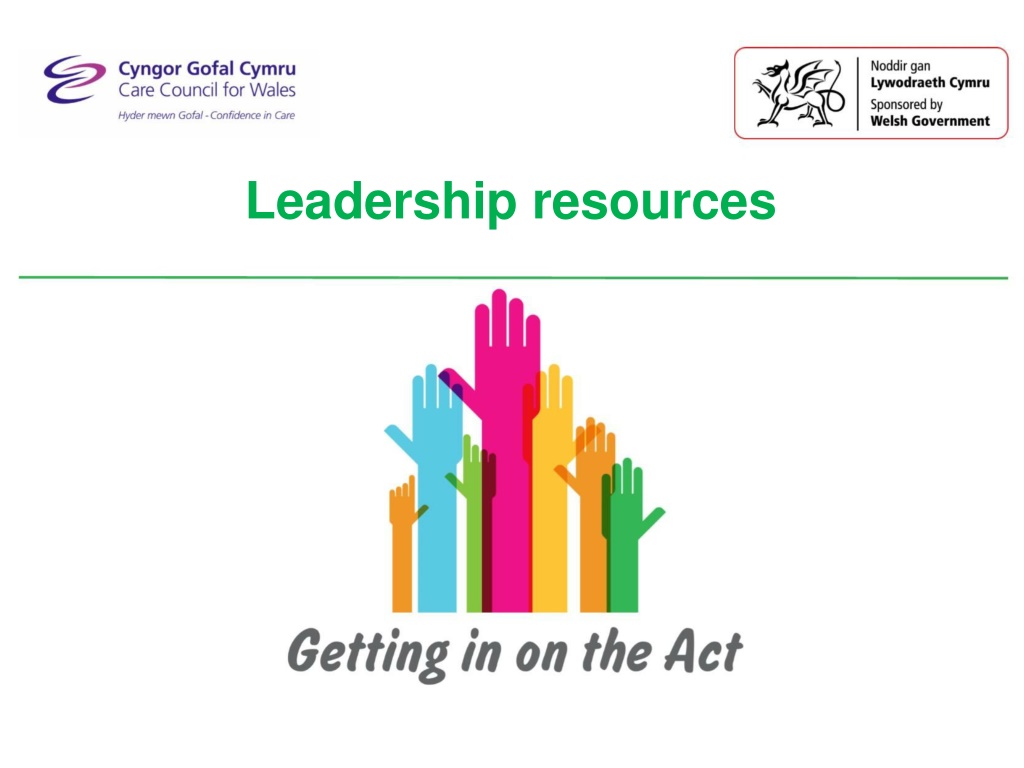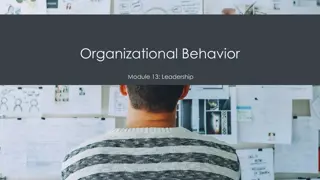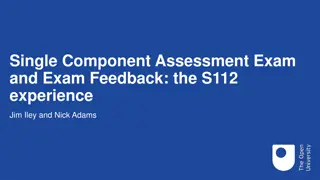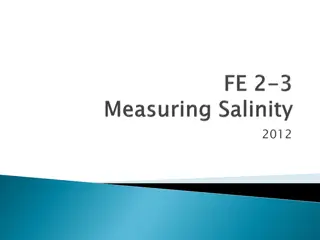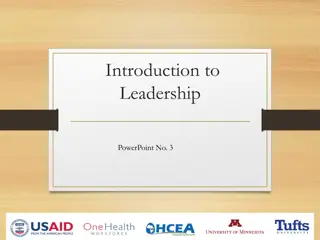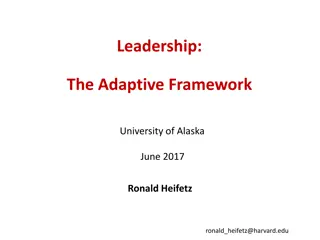Leadership Resources for Regional Partnership Boards in Wales
A comprehensive set of resources is available for directors, senior managers, elected members, and representatives involved in Regional Partnership Boards in Wales. The resources cover key modules such as an introduction to the Social Services and Well-being Act, roles and responsibilities, making Regional Partnership Boards work, strategic transformation, and the leadership challenge. Each module provides valuable insights to help understand duties, responsibilities, and best practices in implementing the Act within organizations and communities.
Download Presentation

Please find below an Image/Link to download the presentation.
The content on the website is provided AS IS for your information and personal use only. It may not be sold, licensed, or shared on other websites without obtaining consent from the author. Download presentation by click this link. If you encounter any issues during the download, it is possible that the publisher has removed the file from their server.
E N D
Presentation Transcript
Module three s Making Regional work
Overview A set of resources that can be used by strategic leaders, managers and Regional Partnership Boards to help them understand their duties and responsibilities under the Social Services and Well-being (Wales) Act and to make best use of that Act in their respective organisations and communities 3
Aimed at Directors and senior managers in local authorities (including housing, education and social services) Elected members Senior managers for partnership in local health boards Lead board members in local health boards Senior managers in partner organisations and relevant third sector organisations Representatives of people with care and support needs, and carers involved in Regional Partnership Boards 4
They cover Module 1: Introduction to the Social Services and Well-being (Wales) Act 2014 Module 2: Part 9 Co-operation and Overview of the Act, its principles and intentions How it relates to other legislation What s required by the Act Roles and responsibilities Module 3: Making Regional Partnership Boards work Module 4: Strategic transformation Key themes of the transformation agenda Tools for transformation The leadership task Good practice governance Decision making Managing stakeholders Module 5: The Leadership Challenge Overview of the aims and principles of the Act Collaboration and integration agenda Opportunities for wider agencies to support this and the leadership challenge they face 5
Each module is designed to be used flexibly with Boards, partner agencies and their stakeholders Module 1: Introduction to the Social Services and Well-being (Wales) Act 2014 Overview of the Act, its principles & intentions How it relates to other legislation Module 2: Part 9 - Co-operation and What s required by the Act Roles and responsibilities includes PowerPoint slides with facilitator s notes and suggested discussion points includes supplementary materials such as checklists, self-assessments and examples Module 3: Making Regional Partnership Boards Work Good practice governance Decision making Managing Stakeholders Module 4: Strategic Transformation Key themes of the transformation agenda Tools for transformation The Leadership Task Module 5: The Leadership Challenge Overview of the aims and principles of the Act Collaboration and integration agenda Opportunities for wider agencies to support this and the leadership challenge they face
Additional resources Care Council for Wales Information and Learning Hub (http://www.ccwales.org.uk/getting-in-on-the- act-hub/) Social Services Improvement Agency Interactive Guide to Implementation of the Social Services and Well-being (Wales) Act (http://www.ssiacymru.org.uk/home.php?page _id=8914)
Module three s Making Regional work
Module objectives To consider what good governance arrangements look like, and reflect on what this means for your own local and regional arrangements To reflect on the principles of good decision-making for Boards and how this might be managed in the future To consider how to manage the range of stakeholders at a local and regional level 9
Contents An exploration of what might constitute good governance for a Regional Partnership Board An opportunity to compare this with your Board arrangements and identify any issues to address 10
Why is this important? The Act requires the development of Regional Partnership Boards by local authorities and local health boards to set the strategic direction for the transformation of health, well-being and social services It brings together a range of partner organisations and representatives and sets out its expectations for their role in shaping services and meeting the care and support needs for local populations It is crucial that these Boards provide the leadership required for the implementation of the Act and are fit for purpose 11
Regional Partnership Boards will manage and develop services to secure strategic planning and partnership working between local authorities and local health boards, to ensure effective services, care and support are in place to best meet the needs of their respective population My care is planned by me with people working together to understand me, my family, and carer(s) giving me control, and bringing together services to achieve the outcomes important to me. 12
Regional Partnership Boards How will they operate? Terms of Reference to show they: have clear responsibility for engaging with local citizens about the Act see their role as providing scrutiny and oversight of its implementation provide the co-ordinated response to the regional strategic priorities through an effective regional leadership structure have adopted a range of governance arrangements and structures to work collaboratively A fundamental requirement for all the Boards to have strong governance arrangements which allow robust decision making, and promotes collaboration and integration where needed
What does good governance look like? Good governance is about the processes for making and implementing decisions. It s not about making correct decisions, but about the best possible process for making those decisions. Wales Audit Office website (4 November 2015) 14
Governance process The Board Board meetings Organisational support staff and structures Sets the vision and direction, and establishes the framework in which it will operate Stays up-to-date on activities and progress towards achieving its vision Takes decisions to enable the Board to achieve its vision Implements decisions in-line with the vision and plans Reports back to the Board 15
The Good Governance Standard for Public Services (2004) is intended for use by all organisations and partnerships that work for the public, using public money
NHS Wales Governance is about vision, strategy, leadership, probity and ethics, as well as assurance and transparency Governance activity should provide confidence to all stakeholders, not just to the regulators 17
NHS Wales Board governance accountabilities Learn and practice your role and hold the vision Ensure your Board sets a definite direction Ensure probity and governance Use your experience to contribute and guard against your own conflict of interest Be objective and logical, disciplined and methodical Be diligent and probing; hold managers to account 18
How do Boards generally operate? Effective Boards Poor Boards Are happy operating strategically and do not get involved in the operational management decisions Work with key stakeholders and other governance arrangements to ensure alignment and shared priority setting Work well with staff to ensure decisions are acted upon Delegate clearly to sub-groups, committees, etc, to deliver actions. Sets timescales and expectations. Poor attendance by Board members, low engagement Ineffective and poorly run meetings that mean issues do not get resolved Poor rapport between members, meaning collaboration and shared decision making is impossible Dominance at meetings by a few individuals 19
Good decision making in public services Realistic goals set out at the beginning Clear scope for the tasks ahead A shared understanding of the difference between a perfect solution to a problem, versus what is a good enough solution Robust, evidence based not just anecdotal Addresses an identified need, not just something which is the flavour of the month Reached through collaboration and partnership working, but recognises that different people bring different skills, views and perspectives to the table 20
Regional Partnership Boards Characteristics of success Focus on the purpose of the partnership and the outcomes for the community Members and officers working together to achieve a common purpose with clearly defined functions and roles, and clear powers of delegation Promoting partnership values and demonstrating values of good governance through upholding high standards of conduct and behaviour Taking informed, transparent decisions which are understood at all levels of the partnership and subject to effective scrutiny and managing risk
Regional Partnership Boards Characteristics of success Ensuring delivery of safe, quality services with a proper grip on resources Developing capacity and capability of members and officers to be effective Engaging with local people and other stakeholders to ensure robust public accountability
Regional Partnership Boards Key questions How well do you understand, and can map, how your Board links with other governance arrangements in the region, and at a local level? Does your board have clear objectives, plans and timeframes which are understood by all members? What will you use to measure how successful you have been in meeting your goals? Have you mapped and understood what factors may impact on how successful the board is in achieving its aims and objectives (e.g. other legislation, financial pressures, etc)? Can you describe how you will take back decisions and discussions to your individual organisations and ensure they are acted upon? Are you clear on the values you share and how you will work together to meet the aims of the Act? 23
Discussion Identify what areas the Board may need to strengthen as it moves forward in its approach to implementing the Act Is the current governance structure right and are there any improvements needed? Note any specific actions needed Is there further development/training and/or support required for members? 24
Regional Partnership Boards Working with stakeholders New legislation (including the Well-being of Future Generations (Wales) Act 2015) requires local authorities and partners to consider how they work collaboratively to improve local well-being Boards will need to understand how they link with, and contribute to, the planning arrangements of a variety of stakeholders PSB LA Pooled budget governance cabinets and scrutiny Regional safeguarding boards Regional Partnership Board Other agency boards Citizens panel and other fora Regional collaborative projects LHB board
Discussion Reflect on the various boards, groups, agencies and structures you might need to work with as a Regional Partnership Board: How are you reporting into (and back from) your own organisation? How can you foster strong links between all the groups you may need to work with? What might you need to do to ensure assessments and strategic plans are aligned where necessary? Where might you experience conflicting agendas? How might you work collaboratively to overcome these?
